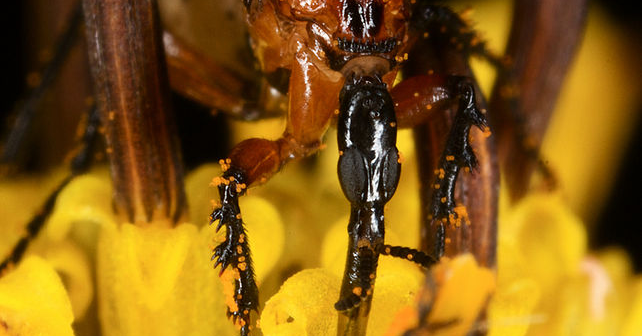By Dangelo Smith
Whether you have encountered them splattered across your car hood, in your food, or flying around attacking you in swarms, lovebugs (also known as the march fly, double-headed bug, and honeymoon fly,) are an all too familiar face for residents of not just Saint Leo but, Florida in general. Infamously, lovebugs gained their name for their unique way of mating in midair, and Florida has been plagued by them as early as the 1940s. They first migrated from Central America, making their way to places such as Louisiana, Georgia, and ultimately, Florida.
Since lovebugs are not indigenous to Florida’s terrain, it has spawned many mad scientist theories of how lovebugs originated. The most popular conspiracy is that lovebugs were created at the University of Florida as a solution to the mosquito problem at the time. They were supposed to mate with male mosquitoes but, be sterile and produce no offspring. However, a pair escaped into the wild, and due to having no natural predator, their population was able to rapidly explode into millions.

Lovebugs first migrated from Central America, making their way to places such as Louisiana, Georgia, and ultimately, Florida.
Although lovebugs pose no harm because they don’t bite or sting and have a lifespan of a few days, these pests are a nuisance when they bundle up in huge swarms making the whole Saint Leo a canvas for their gooey impacts. When this happens, they can be tedious to clean off car windshields, bothersome when trying to eat or sit down, and irritating when trying to walk to class. Here at Saint Leo University, there has been an unprecedented increase in these Lovebugs. One could hardly enjoy a meal at the cafeteria outdoors without trying to eat and defend their food. Additionally, many pathways have become overrun by lovebugs that become ecstatic when anyone crosses their path.
According to Dr. William Ellis, Assistant Professor of the College of Arts and Sciences, lovebugs become active around two distinct seasons of the year, early fall and spring when the temperature is right for their reproductive cycle due to long rain showers followed by long dry spells of the sun. Ellis then said that as annoying as we may find them, they play a vital role in the environment.
“They contribute to the breakdown of lawn clippings. When you mow grass, the clippings become dead material that otherwise would sit there and slowly decay. They’ll consume it to reduce the load and also release the nutrients of the material that are still around, and they are beneficial in the nutrients cycle.”
Besides, Ellis made a point that it might do more harm than good to take any measures in reducing the population of lovebugs, saying,
“There is nothing we could or should do. If we did do something, it is likely not just going to affect the lovebugs, but may harm other insects that are even more beneficial than lovebugs.”
However, not everyone seems to share Ellis’ compassion. Logan Sander, a Cyber Security major, freshmen, and commuter of Saint Leo University has stated,
“Although they are not too bad, lovebugs die on my windshield a lot, so I have to clean my car almost every day. I would like for Saint Leo to possibly control them if they can because they are periodically annoying.”
This time a next student Dalton Lang, History major, and freshman, takes Ellis’ side stating,
“I am a born and raised Floridian, so I have grown accustomed to them.” But, at the same time, he raises some concerns for the school by also exclaiming, “They are not a problem. They don’t bite. They don’t sting. But, they are certainly annoying.”
Additionally, Lang stated, “No lovebugs are in my dorms, but I have seen them in other people’s dorms and frequently around campus.”
So, this raises the question, are lovebugs a big enough issue that Saint Leo needs to inspect?






